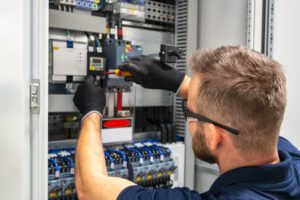Understanding the Job Market for Electrical Contractors
Electrical Contractors perform specialized construction activities relating to designing, building, and maintaining electrical circuits. Electrical contractors are also referred to as electricians. Their role helps ensure that homes, businesses, public buildings, and even other public structures are fitted with power distribution systems that meet an individual’s needs. Contractors provide a range of services, and there are many types of electrical contractors on the market today.

One type of electrical contractor is electrical line contractors. These individuals come into the construction industry with years of construction experience and a proven track record of completing projects that meet or exceed the most stringent electrical safety codes. Electrician line contractors work to identify potential electrical hazards, make recommendations for improvement, and oversee the installation of newly-built or repaired electrical systems. Most electricians under this classification hold a current license to perform electrical systems in residential buildings, commercial buildings, and other facilities such as hospitals and government buildings.
Another type of electrical contractor comes as part of a crew that works together during a building or facility. Construction managers designate one particular person, usually an electrician, to oversee the entire electrical construction project. Other construction personnel may be involved in the planning and coordination of the electrical work but will not be involved in every step of the process. This is usually reserved for project supervisors, architects, and other project administrators. Project managers often contract out the work to a contractor who has experience and expertise in overseeing the overall construction of large buildings and facilities.
There are also different types of electrical contractors who specialize in specific fields of the job. For example, one might consider himself specialized in installing various types of equipment, while another may focus his attention entirely on wiring systems. Electrical contractors can also specialize by type of work, whether residential, commercial, or mechanical. Finally, some general contractors manage a broad range of jobs related to electrical work, while others have particular interests. When it comes to trades, however, the content of contractors is nearly limitless.
One electrical contractor works primarily in residential areas and specializes in repairing electrical components in homes, office buildings, condos, and even business properties. These contractors typically work in two ways. The first type is responsible for installing and repairing different kinds of electrical components in homes, and the second type works mainly in improving the functionality of existing electrical components. One of the primary functions of such electrical contractors is to install new lighting and appliances, new wiring systems, and other major renovations in homes and businesses. They also make sure that the electrical system is safe to operate.
Some other types of electrical contractors specialize in making alterations to electrical systems that are already in place. One such profession involves updating the wiring in offices and various buildings, particularly schools and churches. Most electricians who work with schools do so as part of the school’s maintenance plan. This service requires specific knowledge of the school’s wiring system, which the electrical contractors often retain. Electricians who government agencies employ often focus on making electrical improvements that help government offices run more efficiently.
Other types of electrical contractors include high-voltage power transmission contractors and commercial power line contractors. High voltage power transmission contractors deal mainly in high voltage power transmission lines, which are responsible for transferring electricity from one electrical location to another. These high voltage power transmission lines are responsible for moving large amounts of electrical current between facilities. On the other hand, commercial power line contractors are primarily engaged in the construction and maintenance of different types of high voltage power transmission lines. These contractors are responsible for keeping all lines in operation, and they ensure that the current-voltage is at levels that are appropriate for the facilities they serve.
The job market for electrical contractors is expected to remain stable in the next few years. The need for new and more efficient high-voltage power lines is expected to continue and the need for new and improved distribution lines. Both of these developments are expected to create a consistent amount of demand for qualified electrical contractors. In addition, there is likely to be a continued increase in the number of jobs that remain in the hands of electrical contractors. It will be interesting to follow the job market during and after an economic recession to determine whether jobs will shift back to the hands of general contractors.